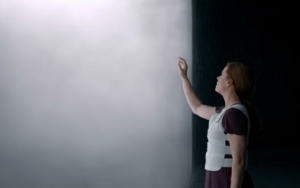THE FAREWELL: 3 ½ STARS. “brims with heart and humour.”
“Based on an actual lie,” reads the opening title credit of “The Farewell,” a new dramedy with “Crazy Rich Asians” breakout star Awkwafina. It’s a funny reminder that the story is actually taken from director Lulu Wang’s life experience of visiting her terminally ill grandmother under false pretenses.
Bad news keeps coming Billi’s (Awkwafina) way. She can’t pay her pricey New York City rent, a Guggenheim Fellowship she hoped to land was denied and worse, she learns her beloved grandmother Nai Nai (Shuzhen Zhou) in Northeast China has terminal cancer. The family, lead by Billi’s stern mother Jian (Diana Lin), have decided to shield the older woman from the news so she can enjoy her whatever time she has left. “Chinese people have a saying,” she says. “It’s not the cancer that kills them, it’s the fear.” Instead the family plans a ruse, an elaborate wedding for Billi’s cousin in Changchun, to serve as an excuse for the family to gather and pay their last respects. Billi hates keeping the truth from her grandmother, but with few reasons to stay in New York she shows up at the “wedding” unannounced to say her goodbyes and confront traditions that seem foreign to her.
“The Farewell” is a lo-fi family drama that brims with heart and humour. Wang maintains focus, never veering from the central premise of a family taking on the burden of pain, sparing their much-loved Nai Nai any feelings of distress. There isn’t much actual drama, no screaming matches, very little interpersonal conflict; just nicely observed naturalistic behaviour.
Holding the film’s center are Billie and Nai Nai. As a young woman grappling with a tradition she doesn’t completely agree with or understand Awkwafina does nice, understated work. It’s a far cry from her more flamboyant supporting performances in “Crazy Rich Asians,” “Neighbors 2: Sorority Rising” and “Ocean’s Eight” that heartbreakingly illustrates the push-and-pull she feels between the two belief systems that have shaped her life.
“The Farewell’s” beating heart is Nai Nai. Her love for her family is unconditional and, as the family’s matriarch, she is the hub that these very different people orbit around. Zhou brings a sprightly charisma to the role that steals every scene in which she appears. Her light touch brings with it a great deal of humour but the smaller, more intimate moments between Nai Nai and her family are packed with emotion.
“The Farewell” is a slow burn, a movie that builds to a poignant climax that not only feels earned but deserved.

